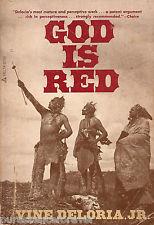While I don’t think that Vine Deloria’s God Is Red: A Native View of Religion (1973) does an especially good job of describing animist worldviews, Deloria clearly understood that these worldviews cannot be crammed into western conceptual categories or analytical frameworks:
There are serious questions whether Indian tribes actually had any conception of religion or a deity at all. Wherever we find Indians and whenever we inquire about about their idea of God, they tell us that beneath the surface of the physical universe is a mysterious spiritual power which cannot be described in human terms that must remain always the “Great Mystery.” (151)
Although several generations of scholars have sought to devise a comprehensive theory of religions that would explain how [tribal religions and world religions] are similar to each other, I can find no satisfactory explanation of what elements they have in common. Perhaps the most popular explanation is the device whereby cultural evolutionists see tribal religions as primitive efforts to come to grips with their experiences in nature and later world religions as sublime expressions of religious knowledge.
Academic orthodoxy in religious studies regards the statements of world religions as a higher evolved expression of religion primarily because the concepts are [supposedly] more rational. Tribal religions, with their emotional and ceremonial emphasis, are placed at the bottom of the cultural evolutionary scale because they practice [i.e., are action oriented] rather than preach [i.e., are idea oriented]. Unfortunately, the evolutionary framework [dominates comparative religious studies] and it is very difficult to get anyone to break out of this context and look seriously at the data. (154)
The interpretation of religion has always been regarded as the exclusive property of Westerners, and the explanatory categories used in studying religious phenomena have been derived from the doctrines of the Christian religion. (288) [Tribal religion cannot] be understood in Western categories (290).
If we take the data seriously, as Deloria demands, we would question his use of the term “religion” to describe these worldviews. Ironically, it appears he has internalized the very category or construct that he rightly rejects.


